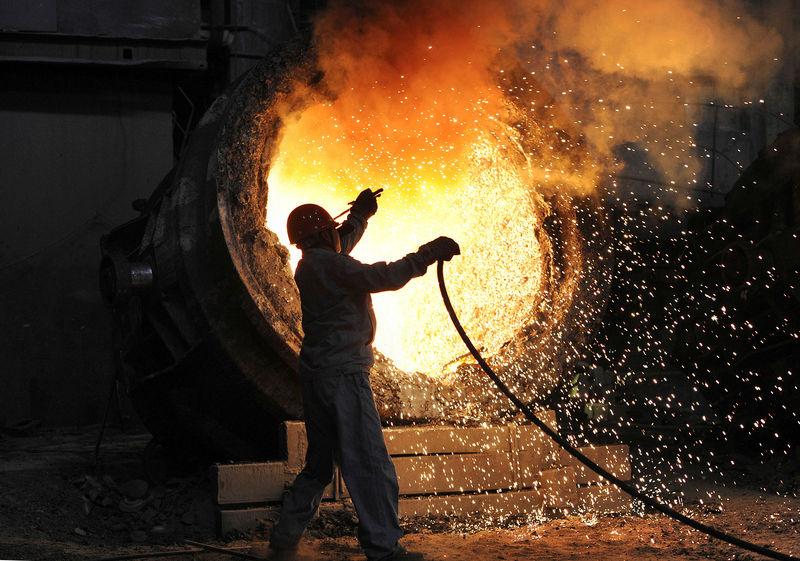By Stella Qiu and Ryan Woo
BEIJING (Reuters) - China's factory inflation slowed in May as faltering manufacturing hit demand, reinforcing worries about cooling growth in the world's second-largest economy, while a surge in food prices could add to consumer grievances about living costs.
The slowdown was driven by declines in industrial commodities prices and was in line with the downbeat factory activity seen in May. It also comes amid China's worsening trade dispute with Washington, which analysts fear could trigger a global recession.
China's producer price index (PPI) in May rose 0.6% year-on-year, the National Bureau of Statistics (NBS) said in a statement on Wednesday, in line with analyst expectations and lower than a 0.9% uptick in April.
In contrast to the softer upstream prices, consumer inflation accelerated, driven by soaring food prices, which rose at their fastest pace in seven years, as bad weather hit fruit production and African swine fever wiped out pork supply.
However, while analysts expect some upside risks to the headline consumer price index in coming months, most do not expect retail inflation to constrain the central bank's hand in easing monetary policy to prop up slowing growth.
"With economic growth unlikely to stage a strong recovery and industrial commodity prices likely to remain subdued, we don't see much upside to PPI and non-food CPI," said Capital Economics in a note on Wednesday.
Producer inflation gauges in China, closely tracked by analysts and investors, are seen as bellwethers of industrial demand in the economy.
As the trade war between Washington and Beijing heats up, investors and analysts are increasingly concerned the dispute could erode global demand for production.
China's exports unexpectedly returned to modest growth in May but imports fell at the sharpest rate in nearly three years.
Raw material prices fell 0.6% last month while price gains in upstream sectors such as oil and natural gas extraction eased.
Despite Beijing's effort to step up big-ticket infrastructure projects, sluggish demand has dragged growth in the prices of construction materials.
Steel consumption has waned as construction slackened amid high temperatures and rainfall. Steel rebar logged its worst weekly performance since late December in the last week of May, while other steel-making raw materials dipped alongside.
China's copper imports, a widely-used building material and a key gauge of economic demand, sank 10.9% in May from the previous month, reversing the gain seen in April.
SOARING FOOD PRICES
The consumer price index (CPI) in May rose 2.7 % from a year earlier, NBS data showed on Wednesday, in line with expectations and the fastest rise since February 2018.
The headline jump was driven by a 7.7% year-on-year increase in the food price index, the fastest pace since January 2010 and higher than April's reading of 6.1%.
Fresh fruit prices soared 26.7% in May from a year earlier and hovered around historical highs, according to NBS, after bad weather hit major producing regions, while the escalating China-U.S. trade war made it difficult for fruit traders to find alternatives to fill the shortage.
However, Chen Changsheng, a researcher with China's State Council, said the government should look past these short-term disturbances in their deliberations over macroeconomic policy.
"Even though the headline CPI figure will face some upward risks...but from the macro perspective, we advise looking at the core CPI," Chen said at a forum in Beijing at the end of last month.
The core inflation that strips out volatile food and energy prices eased to 1.6% in May from a year earlier, from 1.7% a month earlier.
On a month-on-month basis, the CPI remain unchanged, compared with a 0.1% gain in April.
